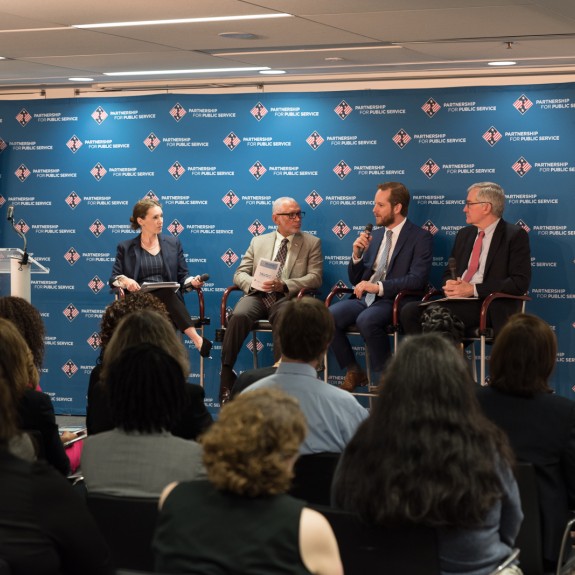Renewing America's Civil Service
Renewing America's Civil Service
Renewing America’s Civil Service was a joint initiative of the Partnership for Public Service and the Volcker Alliance to press for an overhaul of the outdated federal civil service system. Backed by a bipartisan group of leaders from across sectors, the effort identified tangible legislative and executive branch solutions to the most severe problems in the government personnel system.

The Need
It has been more than 40 years since the last meaningful civil service reform. Even as the challenges facing the nation have changed dramatically, the system governing more than two million federal civilian employees has remained stuck in the past, serving as an impediment rather than an aid in attracting, hiring, retaining, and managing a highly skilled workforce. The need for civil service modernization is paramount.
The Response
Working together, and guided by an advisory panel, the Partnership for Public Service and the Volcker Alliance developed a set of recommendations to renew America’s civil service.
The U.S. government’s approach to recruiting, developing and retaining a highly skilled workforce requires modernization to keep pace with the changing market for talent. We believe that America needs a civil service that:
• Can deliver effective and efficient government to meet the most critical challenges facing the American people,
• Is independent, free from undue political influence, and preserves the Merit System Principles,
• Reflects the increasing need for knowledge-based skills in the rapidly changing, complex, globalized environment in which government operates, and
• Upholds a culture of excellence in service that will inspire trust from the American people and attract the best and brightest into public service.
Some recommended opportunities for reform include:
Recruitment and Hiring: Only 6 percent of federal employees are in their 20s, compared with 21 percent of employees in the private sector, and that already low number is dropping. Furthermore, in 2017, agencies took an average of 106 days to hire employees. The entire hiring process should be overhauled, beginning by passing legislation pending in the Senate to enable faster hiring of students and recent graduates. The federal government can become a more competitive employer by streamlining hiring and doing a better job of identifying the best pools of candidates for open jobs.
Leadership development: Our government should provide employees increased opportunities for continuous learning. The civil service needs mandatory training for managers and supervisors, growth paths for future leaders in both management and technical roles, and meaningful performance management that provides incentives to recognize and reward good performers and do a better job of handling issues surrounding poor performers. We also need to ensure that the Senior Executive Service is a world-class cadre of managers who are empowered to tackle our nation’s most pressing problems by working across the federal enterprise.
Workforce agility: Our nation benefits when skilled professionals want to spend their careers in public service. At the same time, our nation is missing out on the opportunity to tap the talents of those willing to serve for shorter tenures. Legislation pending in the Senate would take sensible steps to remedy that situation. We can bring public service more in line with the nimble model common in the private sector, including through public-private talent exchanges and options for federal employees to rotate into different positions.
Pay and Classification: The federal compensation system is almost 70 years old, designed for clerical workers and not for professionals with the highly specialized skills needed for today’s knowledge-based economy. An occupation-specific, market-sensitive compensation system will attract and retain people with the skills needed to better serve the public.
Engagement from both ends of Pennsylvania Avenue: The last major revision of civil service laws, the Civil Service Reform Act of 1978, was successful because the president and both political parties worked toward a civil service system that would serve the American people more effectively, regardless of which party controlled the White House or the Congress. Making lasting changes today will require the same type of collaboration on the planning, implementation, resource investment, and oversight of modernization.
Deliverables
The Renewing America’s Civil Service project team engaged with a wide variety of stakeholders to identify high need areas of reform that the legislative and executive branches should prioritize to immediately improve the federal civil service. Those recommendations were endorsed by the advisory panel and are included in the summary report.
Several of the recommendations advanced by the advisory panel were included in the 2017 National Defense Reauthorization Act, and have continued to inform the discussion around civil service modernization in the years since.
ADVISORY PANEL
The Partnership and Volcker Alliance were supported by an advisory board of public and private sector leaders in calling for civil service reform. They are:
- Paul A. Volcker, chair; chairman, The Volcker Alliance; former chairman, Federal Reserve Board of Governors
- Mitch Daniels, president of Purdue University; former governor of Indiana and former director of the Office of Management and Budget
- Tom Davis, director, federal government affairs, Deloitte; former congressman from Virginia and former chairman of the House Committee on Oversight and Government Reform
- Ted Kaufman, former senator from Delaware
- Lester Lyles, chairman of the board, USAA; former Air Force vice chief of staff and former commander of Air Force Materiel Command
- Hank Paulson, chairman, Paulson Institute; former secretary of the Treasury and former chairman and CEO of Goldman Sachs
- Penny Pritzker, co-founder and chairman, PSP Capital Partners and Pritzker Realty Group; former secretary of Commerce